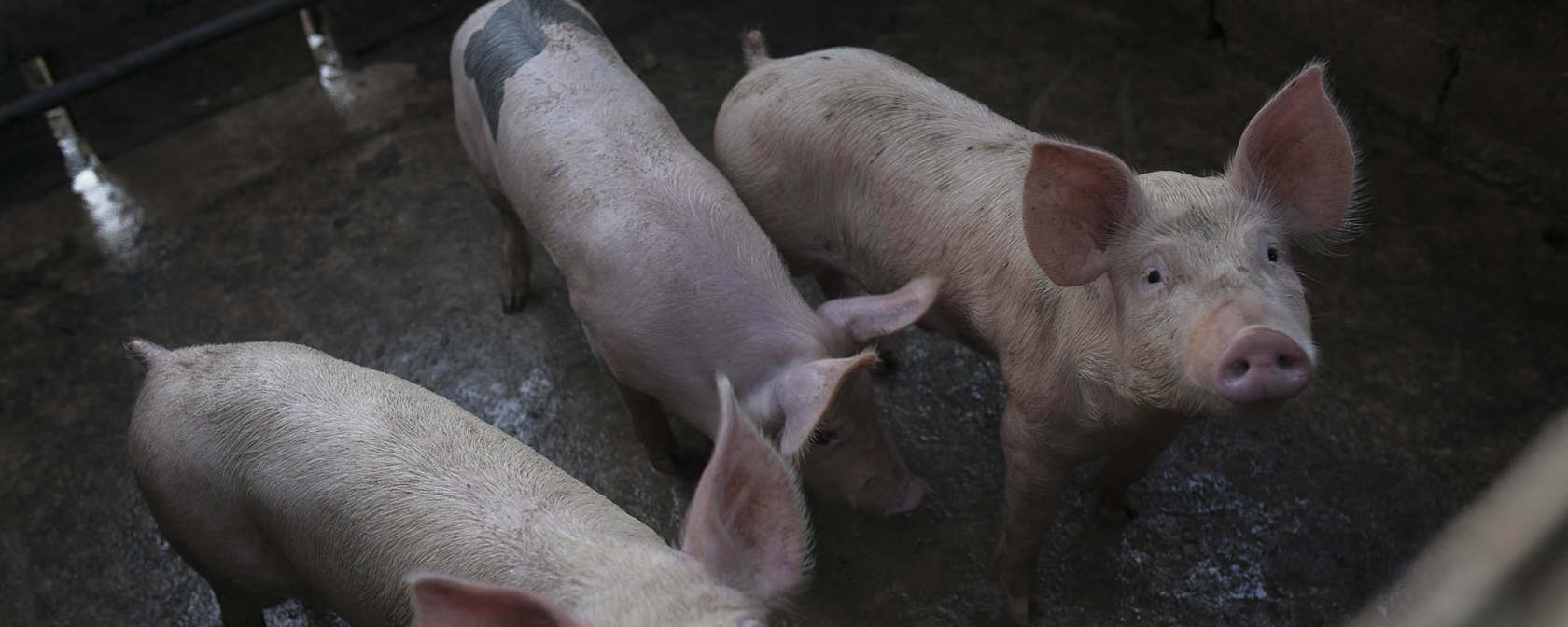By Sara Amundson and Kitty Block
In recent weeks, even as slaughterhouses have emerged as hotspots for the coronavirus pandemic, the Trump administration has been quietly issuing record numbers of waivers for them to kill animals at higher speeds. Now, a coalition of animal welfare groups, workers groups and consumer organizations is asking Congressional leaders to impose a moratorium on such indiscriminate line speed increases, which make slaughterhouses even more dangerous for workers and further increase animal suffering.
The letter from 20 groups, including the Humane Society of the United States and Humane Society Legislative Fund, is addressed to Senate Majority Leader Mitch McConnell, R-Ky., Senate Minority Leader Chuck Schumer, D-NY, Speaker Nancy Pelosi, D-Calif., and Rep. Kevin McCarthy, R-Calif. It comes in the wake of President Trump’s executive order last week, which the meat industry helped to draft, and which gives the industry cover to operate despite outbreaks and deaths among workers.
Our letter urges the Congressional leaders to include language in the fourth coronavirus relief package directing the U.S. Department of Agriculture’s Food Safety Inspection Service (FSIS) to retract approvals for all plants currently operating at higher line speeds, cease issuing new approvals, and take additional steps to ensure social distancing at slaughterhouses.
“The suspension of these dangerous systems will help protect workers from further injury, as well as protect animal welfare and food safety,” the letter says.
Since the pandemic began, more than 5,000 cases of coronavirus infections have been tied to 115 slaughterhouses in 19 states, and at least 20 workers have died. A South Dakota pig slaughterhouse has been linked to nearly 900 cases of the disease, making it one of the largest clusters in the country.
The USDA itself acknowledges slower speeds could be necessary in the midst of the pandemic. “There will be some less production, some inefficiency based on line speeds,” Sonny Perdue, the secretary of agriculture, has said. And a report from the Centers for Disease Control and Prevention recognizes slower speeds are needed, recommending that facilities reduce their rate of animal processing to allow for critical social distancing measures.
Guidance from the Occupational Safety and Health Administration in the wake of the pandemic also calls upon slaughterhouses to modify production lines to minimize the spread of the virus and allow time for workers to wash their hands with soap and sanitize equipment.
But despite evidence of coronavirus infection spread in slaughterhouses, between March 26th and April 20th this year, FSIS approved waivers for 17 slaughterhouses to kill animals at faster speeds than they already did. This includes 16 chicken plants, which were allowed to speed up slaughter lines from an already breakneck 140 birds killed per minute to 175 per minute. FSIS recently granted a waiver to a cattle plant, allowing the company to increase slaughter speeds and shift inspection duties from its own inspectors to untrained plant employees.
The agency has also continued to roll out its new inspection system for pig slaughter, which—among other things—entirely removes line speed caps, resulting in a rough average of 1,300 pigs killed per hour. Under a similar inspection system created in 2014, turkeys can be killed at a rate of up to 55 birds per minute.
Animals in slaughterhouses already endure tremendous suffering in their final moments. At chicken slaughterhouses, for instance, workers struggling to keep up with the rapidly moving slaughter lines grab the chickens and slam them into shackles, injuring the animals’ fragile legs. Some birds miss the throat-cutting blade and enter the scalder—a tank of extremely hot water—alive and fully conscious, resulting in a terrible death.
The conditions at crowded slaughterhouses also compromise the safety of the food placed on American dinner tables because more crowded lines mean poorer sanitation, which increases the risk of food contamination from dangerous pathogens.
The HSUS has been fighting increased line speeds in the courts, and we will continue opposing these efforts with even more urgency in these challenging times. We now ask Congress to act swiftly to ensure the safety of workers and prevent more animal suffering by stopping slaughterhouses from operating at higher speeds. The world is in the midst of a pandemic, and this is not the time for our government to prioritize the bottom lines of giant meat producers.
Kitty Block is President and CEO of the Humane Society of the United States.




